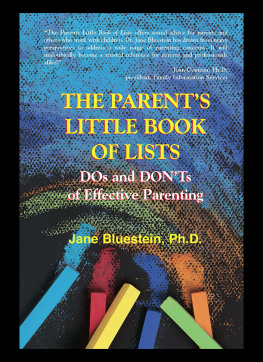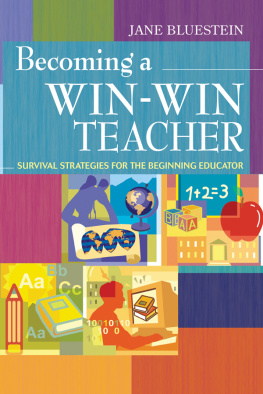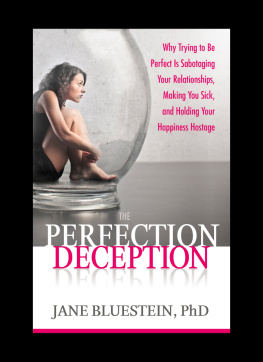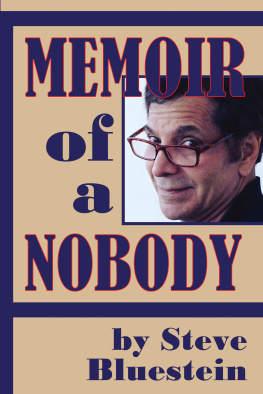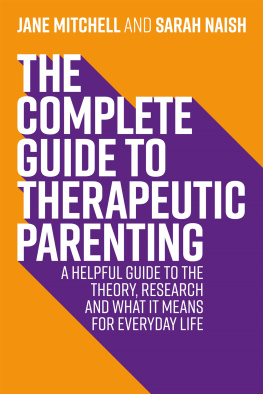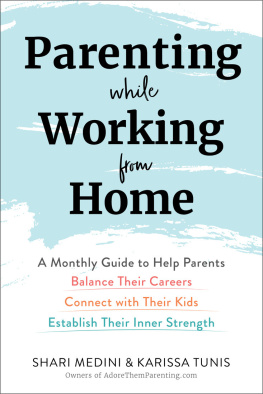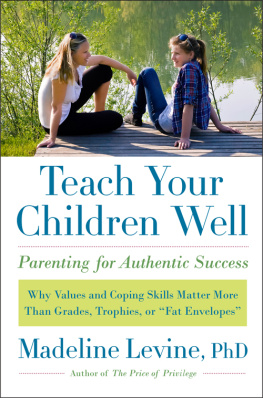Health Communications, Inc.
Deerfield Beach, Florida
www.hcibooks.com
Library of Congress Cataloging-in-Publication Data
Bluestein, Jane.
The parents little book of lists : dos and donts of effective parenting / Jane Bluestein.
p. cm.
Includes bibliographical references and index.
ISBN-13: 978-1-55874-512-4 (trade paper)
ISBN-10: 1-55874-512-2 (trade paper)
1. ParentingUnited StatesHandbooks, manuals, etc.
2. Parent and childUnited StatesHandbooks, manuals, etc. 3. Child rearingUnited StatesHandbooks, manuals, etc.
4. Child psychologyUnited StatesHandbooks, manuals, etc. I. Title.
HQ755.8.B63 1997
649'.1dc2197-29511
CIP
1997 Jane Bluestein
ISBN-13: 978-0-7573-9724-0 (ePub)
ISBN-10: 0-7573-9724-7 (ePub)
All rights reserved. Printed in the United States of America. No part of this publication may be reproduced, stored in a retrieval system or transmitted in any form or by any means, electronic, mechanical, photocopying, recording or otherwise without the written permission of the publisher.
HCI, its logos and marks are trademarks of Health Communications, Inc.
Publisher: Health Communications, Inc.
3201 S.W. 15th Street
Deerfield Beach, Florida 33442-8190
Cover design by Andrea Perrine Brower
ePub created by Dawn Von Strolley Grove
To
Irv Bluestein,
Grace Tereszkiewicz
and Clare Landman.
You are missed.
Contents
In addition to the specific resource people and materials cited for their contributions in the reference section at the end of this book, I wish to acknowledge with great gratitude the hundreds of workshop participants who shared their ideas and experiences anonymously.
A few individuals deserve a special note of thanks. They include:
Lisa Cramer and Linda Sorenson, for reading through the very first draft of this book and for the suggestions and contributions they made, and for helping me hang in there when all these hundreds of bits of information threatened to overwhelm me.
Greta Bratovs and Elvira Medved, for helping me survey and interview workshop participants in my training sessions in Slovenia, and for translating the ideas and contributions we received.
Maurine Renville, M.Ed., M.S.W., for checking some of the principles and terminology for accuracy, clarity and psychological soundness, and for the remarkable healing work she does.
Bert Shapiro and Robert Low, for working with me through the initial incarnation of this book and for graciously releasing me to grow in another direction when it was appropriate to do so.
Judy Lawrence, S. J. Sanchez and Maya Sutton, three of the wisest women in my world, for their friendship, inspiration and encouragement.
Matthew Diener, for getting the vision and respecting the process.
Jerry Tereszkiewicz, an amazing husband and wonderful friend.
A Picture of Positive Parenting
Many years ago, on a trip to the Philadelphia Museum of Art, our class got to see several original Impressionist paintings. I remember our teacher pointing out how the images had been created by separate bits of color, and how these little dots and lines and strokes all came together to produce a picture. If you stood close enough, you could see interesting specks of color, pieces of information that looked nice but communicated nothing in particular until you stood back a bit and saw how they all worked together. The lists in this book likewise present bits of information: little dots, if you will, that work together to create a picture; in this case, a picture of positive, loving parent-child relationships.
In my work with parentsin my workshops and in my writingI often include a short survey to determine whether or not were all trying to paint the same picture. Ill ask the parents how strongly they agree with statements like the following: I want my children to believe that I love them unconditionally, no matter what, I want my kids to feel emotionally safe in their relationships with me, I want my children to be able to think and make decisions, especially when Im not there. I want my kids to be strong and confident enough to resist peer pressure, I want my children to cooperate and do what I ask, I would prefer having win-win interactions to win-lose interactions.
Getting agreement on these goals has rarely been a problem. The hard part comes when we start to look at how we actually act in our relationships with kidswhen we examine how our behaviors shape the nature of our relationships and how they contribute to the behaviors and beliefs that children develop.
Our relationships are products of a number of factors, not the least of which are the actions we bring to them. Just as certain colors and brush strokes will create particular images, moods and impressions for an artist, certain parenting beliefs and behaviors can encourage and support particular outcomes in the relationships parents create with their children. Often, the most familiar behaviors will take parents in entirely different directions than they would like to go. In some cases, their actions can actually make it more difficult for them to achieve their aims!
For example, its difficult for children to feel loved unconditionally when love is most often expressed in association with certain behaviors, achievements or particular choices about their appearance. (Ive heard some parents say, Of course I love my children unconditionally. And I really love them unconditionally when they make the honor roll.) Its hard to feel emotionally safe in a home where parents use power, anger, disappointment or unhappiness to get kids to do what they want.
Often, the same parents who claim to want kids who can think and make decisions independently also want kids who immediately do what they are told. Many parents who want kids who can indeed just say no would be incensed if their kids ever just said no to them . And some parents who want to create win-win interactions are very uncomfortable with the notion of giving children choices other than do it or else.
But we cant have it both ways. Its like wanting to lose weight while insisting, But I always eat six doughnuts for breakfast! Whenever our policies, our habits or our behavior patterns do not support our goals, we have two choices: We either change our behaviors (eat a healthier breakfast) or change our goals (quit wanting to lose weight).
In terms of parenting, lets say your goal is to increase cooperation and minimize conflict in your relationship with your kids, but at the end of the day, you notice that you seem to get exactly the oppositea minimum of cooperation with maximum conflict. At this point, youve got a choice: You either give up your goals and accept things the way they are, or you change. If you want the relationship to change, the way you interact with your kids is going to have to be different somehow, with different thoughts and belief systems, different responses to their behavior, different ways of asking for what you want, different words, a different tone, a different attitude.
This process doesnt have to be quite as overwhelming as it sounds. Even the greatest transformations start with small changes, which is why I started looking at the pieces of the parent-child relationship that are easiest to change. I wanted to identify small, specific parenting behaviors, beliefs and attitudes that could alter the course of the relationship in a big way. The result is the following collection of lists: techniques and ideas, actual questions and statements you can use to help accomplish a particular goal, and loads of practical suggestions that can help you paint a picture of the kind of relationship you want.

